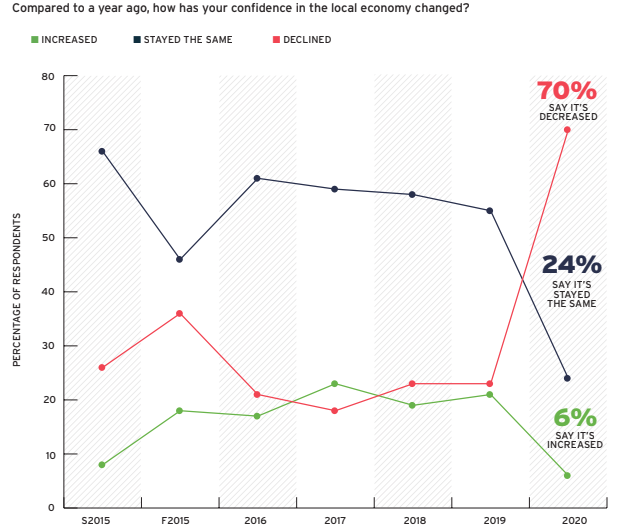As Ottawa’s economy recovers from the initial shock of COVID-19, businesses in Canada’s capital are increasingly falling into two camps: Those positioned for a new wave of growth after escaping the worst of the pandemic’s fallout, and those still struggling to survive.
This economic “bifurcation” was one of the conclusions from several experts who gathered virtually this week to analyze the results of the Welch LLP Ottawa Business Growth Survey report, which was officially released Thursday.
The Ottawa Business Journal – with the Ottawa Board of Trade, Abacus Data and several other partners – surveyed hundreds of local business leaders this summer about their market outlook, hiring intentions, financial performance and other key metrics.
OBJ360 (Sponsored)

It may be a surprise to learn that the rate of population growth for youth aged zero to 19 is nine times greater in the capital region than it is

Parkdale Collective: Hintonburg’s new curated rental living by Richcraft
In the ever-evolving pulse of central Ottawa, something bold, fresh and creative is emerging. Parkdale Collective is more than a place to live – it’s a lifestyle destination for those
The survey found that business confidence levels sharply declined this summer and that many business leaders believe market conditions will worsen further before a sustained recovery takes hold.

“The overall picture is one of deep anxiety, deep uncertainty and a very different business environment,” said Abacus Data CEO David Coletto.
He added that the local findings mirrored the conclusions of his national research.
“Although our fears about the health system being overwhelmed have subsided, there is deep concern about a second spike (in COVID-19 cases),” Coletto said.
Against this backdrop, the Welch LLP Ottawa Business Growth Survey showed the initial economic shock of COVID-19 had an uneven impact on the local business community.
When asked about their hiring intentions, slightly more than one in five respondents said they planned to reduce their headcount. However, almost an equal number of respondents said they planned to hire new employees.

Similarly, when asked about their financial picture, 47 per cent of respondents said their revenues were declining. But a significant, albeit smaller number – 33 per cent – said their top line was growing.
There was a virtually identical breakdown between companies that reported their net income was higher and those that said it was lower.
“The business community is really divided between businesses that are doing OK and those that are struggling,” Coletto said.
‘Bifurcation’
Canadian tech entrepreneur Michele Romanow – president of Clearbanc and one of the stars of CBC’s Dragons’ Den – says she also sees evidence of an economic divide.
“We effectively bifurcated our economy on activities that humans do close together and activities that humans do far apart,” Romanow said in a keynote address.
She estimated that roughly 70 per cent of businesses are currently suffering “because they just can’t do what they used to do in the same way or the same format.”
Conversely, some 30 per cent of businesses have become stronger through the pandemic. Industry incumbents, for example, naturally have an edge during a crisis, Romanow said. However, there are also companies that are seizing upon “secular changes” that are transforming certain industries.
Retail is a commonly cited example as sales shift from in-store purchases to ecommerce.
“But it’s not just people buying (more) online. They’re breaking open categories of things that they had never bought online,” Romanow said, citing groceries and bulky items such as furniture and barbecues as examples of items that many people “thought you had to go to a store” to purchase.
Romanow also highlighted Ottawa-based RVezy, in which she is an investor, as an example of a company that’s been able to capitalize on shifts in consumer behaviour brought on by COVID-19.
Sometimes compared to an Airbnb for motorhomes, RVezy is a peer-to-peer rental platform for recreational vehicles.
“(In late spring), people figured out that the only way they are going to experience any sort of vacation that makes sense – they’re certainly not going to Las Vegas – is the camping road trip,” Romanow said, adding RVezy has seen “an incredible surge” in business from individuals looking to rent a recreational vehicle this summer.
Opportunities in a pandemic
Andrew Arnott, RBC’s regional vice-president of business financial services for Ontario North and East, said there are specific sectors in Ottawa and the broader region that are poised to see significant growth in the coming years.
The tech industry – specifically those companies developing solutions in digital commerce, telemedicine and automation – are “clear winners,” he said. Arnott also noted that the construction sector and its suppliers have proven “robust” throughout the crisis.

Outside the city, he also highlighted eastern Ontario’s manufacturing, agricultural and food processing sectors.
However, Arnott cautioned against fixating on a sector-by-sector view.
“There were companies that were strong pre-COVID that will come through this OK,” he said. “There will be winners in every sector.”
Arnott also argued that the stability provided by the federal government’s presence has not only “sheltered” Ottawa’s economy relative to other cities, but will also accelerate the city’s recovery.
“We’ll be back faster than others,” Arnott predicted.
Read the full 2020 Welch LLP Ottawa Business Growth Survey report by clicking on the cover below:






